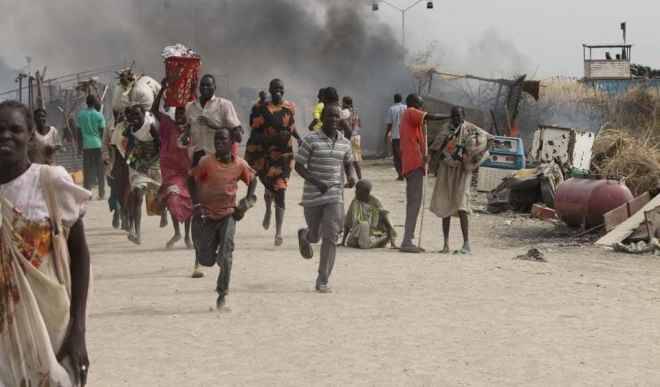Until recently, the federal government tried its best to deceive people that Boko Haram had been “defeated” and “degraded” and were “on the run”.
Many Nigerians recall how in 2015 then President Goodluck Jonathan postponed the elections and stepped out in military fatigues with swagger stick to tour parts of the North affected by insurgency.
- Boko Haram kills 223 civilians, 89 security agents in 7 months
- Boko Haram: Group leads support campaign for Troops
Jonathan’s ruling People’s Democratic Party (PDP) had been criticised by the main opposition leader, General Muhammadu Buhari (Rtd), for not acting swiftly to put an end to the Boko Haram insurgency for years.
At the time, comparisons were made between Jonathan and his main opponent, the retired General, as to which of them appeared to command more respect in uniform.
Candidate Buhari had said that if elected, he would personally lead troops against Boko Haram. It turned out to be one of the many promises he made while campaigning which he failed to keep.
His supporters said that Jonathan should restrict himself to the ceremonial dress uniform of the Commander-in-Chief because he had no right to wear camouflage uniform since he was never a soldier.
Many people voted for the All Progressives Congress (APC) change agenda because they hoped peace would once again reign in the nation. That turned out to be a pipe dream.
All hopes and expectations were placed on the belief that Buhari would be able to back up his words as a retired General and quickly put an end to the insurgency and killings.
It turned out to be a false hope! Right from the start, some Nigerians began to suspect that things would not go well.
The incoming president didn’t have a good record in administration.
His human rights abuses as a military dictator, corruption allegations relating to his spell as Minister for Petroleum, and the scandals associated with the Petroleum Trust Fund (PTF) didn’t help.
In recent weeks, no fewer than 200 killings have been reported in the Dutsinma, Musawa, Kurfi, Danmusa and Safana local government areas of Katsina State.
In Kaduna State where killing of Christians has become a routine almost daily occurrence, the youth leader of Zipkak Community in the Jama’a Local Government Area said government should stop referring to the killers as “bandits”.
He alleged they were Fulani herdsmen engaging in genocide aimed at eliminating all indigenes and taking over their land with support from the highest levels.
He said his people no longer have confidence in government because whenever they decide to stand up and fight for themselves, security agencies arrest them and extort money for bail.
Whether this is true or not, the fact is that government seems totally incapable of doing anything to stop the killings.
Spokespersons for the Department of State Services (DSS) claim that they are “aware” of the presence of Jihadi elements fork Libya, Mali and Niger who seek alliances with armed groups in Nigeria.
Furthermore, border communities routinely see foreign mercenaries who take advantage of the porous borders and “ungoverned spaces” in the forest area.
One of the tragedies of modern day Nigeria is maladministration within the various security agencies.
There are reports of an internal memo within the army which admits that a sizeable number of soldiers are unwilling to engage in counter-terrorism and anti-banditry operations.
The social media is replete with stories of gallant Nigerian troops being massacred by insurgents.
Reports of their atrocious living conditions and failure of leadership to give them rest and relaxation (R & R) away from the front lines are so common.
Videos of combat troops lamenting the conditions under which they engage the enemy are heart-breaking.
Worst still, it’s a slap in their face for so called “repentant” Boko Haram fighters to be integrated into the armed forces to maybe command one day those whose comrades in arms they killed.
Cynics suggest that if government wants to show “repentant” Boko Haram love, they should be accepted into the DSS and posted to guard the presidential villa!
Its increasingly evident that the war against insurgency appears to have been launched without any plan for how to protect the affected populations and minimise collateral damage.
Peace building processes to reverse the failure of the state, prevent violent conflict and build a sustainable society require building conditions in which the local population can see positive change.
The causes of Nigeria’s high level of insecurity are the nation’s well documented ethnicity and religious differences, high level of illiteracy, porous borders, unemployment, poverty and issues of good governance and accountability.
Nothing tangible has been done to rectify these problems. Although the primary consideration of government is to protect lives and property, there is no end in sight to lawlessness and unrestrained violence because they are also the tools which security agencies also use and which garner support for dissidents on a daily basis.
Admittedly, it’s difficult to expect troops who have seen their comrades in arms fall at the front, to be sympathetic towards communities harbouring terrorists, but some of their actions have led to a situation in which these communities look upon both Boko Haram and the Nigerian Army with equal dislike.
The real failure of governance in Nigeria is that while tragically the security situation continues to decline, insecurity and unending war is becoming a way of life in an ever widening swathe within the nation.

 Join Daily Trust WhatsApp Community For Quick Access To News and Happenings Around You.
Join Daily Trust WhatsApp Community For Quick Access To News and Happenings Around You.

